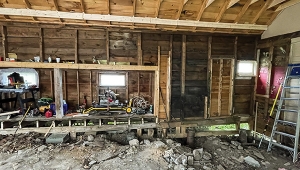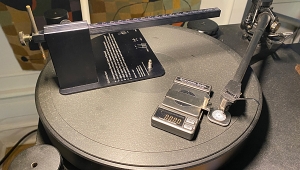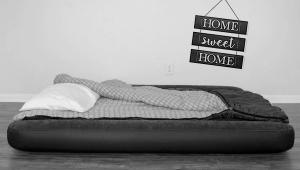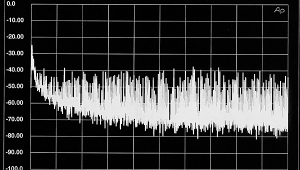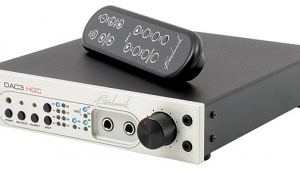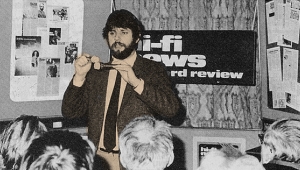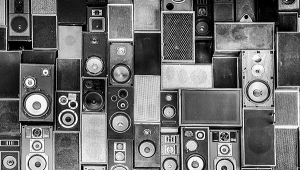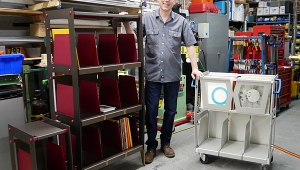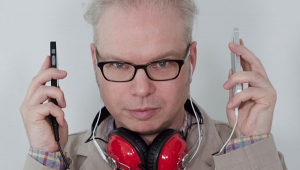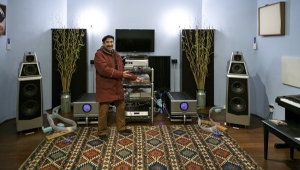| Columns Retired Columns & Blogs |
There's No Business Like the Hi-Fi Business
You're a typical audiophile. You read this magazine and others like it cover to cover, month after month, keeping up with industry trends and insider gossip. You've ingratiated yourself with every hi-fi dealer in your area, all of whom will let you take equipment home for extended auditions, give you generous trade-in allowances, and sell to you at a small percentage above their cost. Never pay retail, you chuckle to yourself, checking the newspaper's classifieds for audio bargains.
On weekends, you chase around to garage sales and flea markets in search of collector's items. You've been buying and trading equipment for years, longer than you can remember, and in the process you've assembled some pretty good systems. Here and there you've acquired a few items that didn't quite live up to their promise, but were too good to part with. They're gathering dust in your basement. Every once in a while someone will mention that a friend is looking for something you've got. Maybe you'll strike a deal, occasionally for a satisfying profit. The reading, the talk, the chase, the acquisition, the trade: it's all part of the fun; in fact, it's probably more what this hobby's about than the music itself.
You've often dreamed about how great it would be to break away from the drudgery of your "real life" and devote yourself entirely to your hobby—you know, make your hobby your business, spend your days doing the things you really love: tweaking and talking and trading hi-fi, hanging out and listening to all those great tunes. Yeah, you're thinking, a hi-fi shop. That's the ticket.
Striking out on your own sounds mighty appealing. You could say goodbye to pain-in-the-ass clients and 8am meetings. No more product development or marketing strategy; no more sales reports, no more hitting your numbers, no more office politics, no more corporate BS. Just a nice little shop with a nice line of gear, in a nice neighborhood with nice customers. You could make a decent living, have a lot of fun. Other folks have done it. Why not you?
Well, you're right, other folks have done it and made it work. Maybe you could, too. But before you punch a hole in your golden parachute, swallow a large dose of reality. Most audio hobbyists have no idea how hard retailers must work, or the kinds of obstacles they must overcome simply to keep their doors open.
I've been in this business since the late '70s, which to me seems like several lifetimes—almost all of it technical, managerial and custom installation work. I've even taken a stab or two at selling, for which I am congenitally maladapted. I began as a technician for Pacific Stereo, which at the time was the biggest, most successful audio chain in North America. (Pacific had dozens of stores on the West Coast, and many others in Chicago, St. Louis, Houston, and Atlanta.) Then, not counting intermittent periods of freelance work, I worked for a locally owned five-store chain, a computer franchise, two high-volume repair shops, a couple of small tweak shops, an upper-mid-fi retailer, one grandiose "Ferrari" shop, and a single-brand speciality shop in a ramshackle old house—10 in all, encompassing most variations on the theme of consumer electronics. All but one are now out of business.
That lone survivor, a mid-fi chain, sought bankruptcy protection during the early-'80s recession that sank its three competitors. (The infusion of a few million dollars from a new owner, and lots of savvy business decisions, put it so firmly on its feet that it now dominates its local market.) Nine out of 10—almost all of the audio retailers I've known, from the corporate giant to Hi-Fi Buddy's corner store—are gone. Those 10 were enterprises in which I was personally involved; I know of many others which have failed, including some that enjoyed the benevolent support of an entire Scandinavian nation. Not very good odds.
Growth experiences
Some warm'n'fuzzy economic theorists believe that statistics are misleading, that not all business failures are really failures; rather, they are growth experiences from which the owners gain valuable insights which they apply to new successful ventures. I'm not so sure about that; I think businesses sail until they sink. Audio stores, like the products they sell, work until they fail. And like those products, most of them will fail; the question is when. The few that succeed do so by learning from the mistakes of others.
If you're serious about moving out of your basement and into the retail world, your first consideration is start-up cost. This includes finding and leasing a storefront, stocking and furnishing it, advertising, and paying yourself and your employees some sort of subsistence wage until the cash starts flowing in. How much? That depends on how big your vision is.
Do you want to open a little used-equipment store? That could be done for $10,000 or less. You could use your own collection as an inventory starter kit, and take in gear on consignment, keeping your costs minimal.
How about a traditional tweak shop, with a few respected lines at several price points, from entry level to moderately high-end? Now we're talking $50,000 or more.
- Log in or register to post comments
